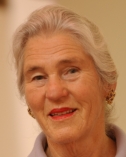explore and connect
InterViews:
» By Last Name
» By Subject
» About the Series
InterViews
 Janet Rowley
Janet Rowley
medicine
(recorded in 2010)
Listen or download interview (mp3, 29 minutes, 28MB)
 Subscribe directly through iTunes
Subscribe directly through iTunes
In 1972, Janet Rowley sat down at her dining room table and made a discovery that would forever change how doctors study and treat cancer. Poring over photographs of chromosomes from patients with chronic myeloid leukemia (CML), the part-time researcher and full-time mother of four boys noticed the patients shared a certain genetic anomaly called a translocation—a piece of one of their chromosomes had broken off and attached itself to another. Consumed by curiosity, she tested more patients and found more translocations, leading her to a new and then controversial conclusion: the translocations weren’t a symptom of the cancer, but its cause. Translocations have since been implicated in other diseases, including several thyroid cancers, lymphomas and sarcomas, and have been used to create new life-saving treatments. Thanks to Rowley’s work, CML patients who were once doomed to die within three to five years of their diagnosis now enjoy a more than 80 percent survival rate. Her contributions to cancer research earned her numerous awards, including the 2009 Presidential Medal of Freedom, the highest civilian honor in the U.S.
Rowley was the University of Chicago’s Blum-Riese Distinguished Service Professor of Medicine, Molecular Genetics & Cell Biology and Human Genetics, and was elected to the National Academy of Sciences in 1984. Janet Rowley died December 17, 2013.
Interview Highlights
Rowley describes growing up in Chicago during the Great Depression, the only child of educators who impressed on her the value of “intellectual independence.” As a girl, she loses herself in books and in the structure and order of biology, and by 23 she earns a medical degree from the University of Chicago. After marrying a fellow physician, Rowley decides to focus on her family life and work only two or three afternoons a week at a children’s clinic.
Her work there with children who have Down Syndrome, which is caused by a chromosome abnormality, inspires her to study genetics and chromosome analysis techniques while in England for her husband’s research. Chromosome analysis proves so fascinating to her that she never returns to the clinic, but instead convinces a former professor to grant her a part-time research position at her alma mater to continue her work. In exchange, she agrees to study the chromosomes of his leukemia patients, and the arrangement soon leads Rowley to remarkable breakthroughs in cancer research. Rowley discusses the impact her work has had on her life and the joy she, now 85 years old at the time of this recording, still feels each day in the lab.
Last Updated: 09-22-2013
Visit the NAS member directory for more information on Janet Rowley.
The audio files linked above are part of the National Academy of Sciences InterViews series. Opinions and statements included in these audio files are those of the interviewee and do not necessarily reflect the views of the National Academy of Sciences.

